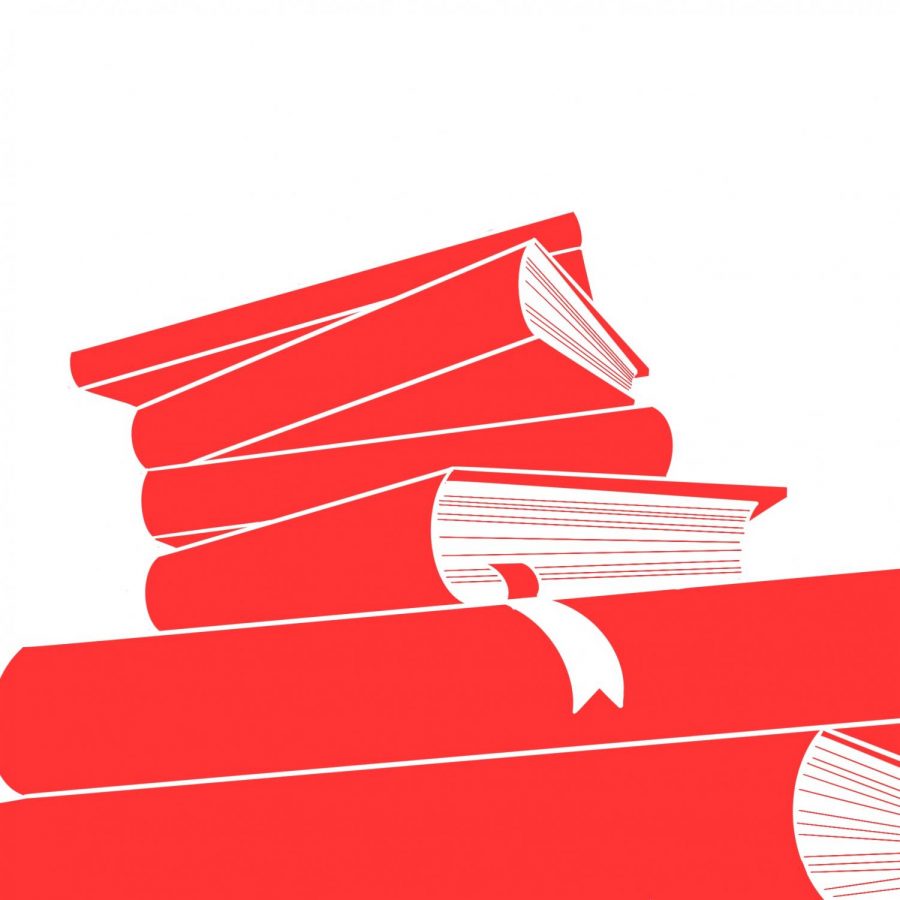- Beavers Digest / Cascades / Culture
- Beavers Digest / Cascades / Experience
- Beavers Digest / Culture
- Beavers Digest / Culture / Expression
- Beavers Digest / Entertainment
- Beavers Digest / Entertainment / Media
- Beavers Digest / Experience
- Beavers Digest / Experience / Wellness
Books to help you navigate your mental health journey
OSU members recommend books to those experiencing a wide range of mental health struggles
By Alex Koetje, OMN Illustrator
When we are first embarking on our mental health journey, books can be quite beneficial in guiding you to comprehend your well-being. This illustration depicts a stack of red books.
November 9, 2021
When there is a lot on your plate, particularly in the aftermath of the coronavirus pandemic, it may be frustrating to come up with strategies for dealing with prolonged loneliness, stress, anxiety or the myriad of other mental health difficulties that have become our new reality.
Mental health is an important aspect of our life, and we must treat it as such. Reading books can help us comprehend our mental health difficulties and aid in navigating our health. Books have intriguing features of realism and lucidity, owing to the fact that they have assisted us in conquering a wide range of challenges as individuals.
According to Kelly McElroy, the student engagement and community outreach librarian at Oregon State University, there are three books that may offer support to a wide range of people experiencing mental health struggles. McElroy recommends:
- Rock Steady: Brilliant Advice from my Bipolar Life by Ellen Forney
This book is not available at the Valley Library but is available for Summit requests through the library.
“In this illustrated guide, comics artist Ellen Forney shares recommendations based on her experiences navigating treatment and self-care for bipolar disorder,” McElroy said. “However, the book offers broad enough suggestions—for example, about developing exercise and sleep hygiene—that they will apply to many mental health struggles. This book is a follow up to Forney’s memoir Marbles, which captures her experiences with bipolar, including diagnosis and navigating treatment (which we do have in the library).”
- Ten Ways Not to Commit Suicide: A Memoir by Darryl McDaniels
“Despite the title, this isn’t a self-help book, but a personal narrative by rapper DMC, covering his depression and alcoholism, as well as the ways he found meaning and healing,” McElroy said.
- The Body Keeps the Score: Brain, Mind, Body in the Healing of Trauma by Bessel van der Kolk
“This book provides an approachable introduction to the science of trauma and its effective treatment, by a longtime practitioner and researcher,” McElroy said. “Again, it isn’t so much a self-help guide, but gives an overall picture for understanding the effects of many different types of trauma, and provides insights into proven areas of treatment. It is also very readable—which is part of why I’d recommend it.”
Employees within OSU’s Counseling And Psychological Services have recommended some books to help students understand their mental health issues.
Fernando Frias, a CAPS licensed psychologist, recommends:
- The Happiness Trap: How to Stop Struggling and Start Living by Dr. Russ Harris
Frias explained that the author challenges basic assumptions about the pursuit of happiness and offers an alternative path forward to living more rewarding, fulfilling and (paradoxically) happier lives.
Michele Ribiero, a CAPS licensed psychologist, recommends the following books:
- Five Elements of Well-Being by Rath and Harter
Ribiero said this book is a very easy read and it highlights some very practical ideas on how to create a more healthy life.
“I use it when teaching positive psychology practices and ideas to students,” Ribiero said.
- Wherever You Go, There You Are by Jon Kabat-Zinn
- Power of Now by Eckhart Tolle
Ribiero believes that both books are valuable books on mindfulness and provide clear ideas on how to let go of the past and not to live in the future.
“They are about being in the present and finding the value and power of moment-to-moment living,” Ribiero said.
- Grit by Angela Duckworth
“It is, again, an easy read and talks about how passion and perseverance are the cornerstones to success over just intelligence or raw talent,” Ribiero said.
- My Grandmother’s Hands by Resmaa Menakem
Ribiero said this is a powerful book on healing racial trauma in our bodies and minds through active mindfulness and imagery exercises.
- The Dance of Anger by Harriet Lerner
Ribiero points out that this book is an oldie but a goodie on change in relationships whether that be family, friendship or romance.
Tessie Webster-Henry, a CAPS mental health promotion coordinator, recommends:
- The Gifts of Imperfection by Brené Brown
Webster-Henry said by embracing our authentic selves we create more courage, compassion and connection in our lives, and that is what this book is about.
Alexandria Fripp, a diversity scholar at OSU, recommends the following books:
- The Stress-Proof Brain by Melanie Greenburg, PhD, a Clinical Psychologist.
This book can be requested via interlibrary loan from another library and picked up at the Valley Library.
Fripp said this book aims to educate folks about stress, how to cope with it and how to respond to stressful situations.
- The Mindfulness and Acceptance Workbook for Anxiety by John Forsyth, PhD. and Georg Eifert, PhD.
“There is evidence (based on research and studies) for improvement in anxiety, depression, worry, social anxiety and self-compassion,” Fripp said. “All of these are areas that I think could be beneficial to college students.”
- Creating Well-Being: Four Steps to a Happier, Healthier Life By Pamela Hays, PhD.
This book can be requested via interlibrary loan from another library and picked up at the Valley Library.
Fripp said this book is a part of the American Psychological Association’s LifeTools book series. It is a scientifically-supported guide to general mental wellbeing.
- The Color of Hope: People of Color and Mental Health Narratives.
This book is available at the Valley Library.
“There is a stigma about mental health in many communities,” Fripp said. “However, this book highlights the narratives and experiences of mental health in communities of color in order to combat the stigma in our communities. Narrative-driven approaches like this, in my opinion, make the issue more tangible and relatable and less isolating! I hope this book could help someone talk to a friend or family member about mental health or even get started seeking mental health resources.”
Tosca Lena Ruotolo, a fourth-year student studying creative writing and psychology at OSU, recommends the following books:
- Marbles: Mania, Depression, Michelangelo, and Me: A Graphic Memoir by Ellen Forney
“This story helped me come to terms with my own struggles with depression and anxiety, while showing an honest portrayal of the healing process,” Ruotolo said. “Ellen Forney’s humorous and relatable takes on therapy, medication and interpersonal relationships made me feel heard when I was dealing with my own mental illness episodes.”
- Hyperbole and a Half: Unfortunate Situations, Flawed Coping Mechanisms, Mayhem, and Other Things That Happened by Allie Brosh
Ruotolo said this book still has one of the only representations of depression that they can really relate to.
“I read it before I started experiencing symptoms of mental illness, but years later I’ll still reread passages to remind myself that depressive episodes can and will end,” Ruotolo said.
- Monsters by Ken Dahl (Gabby Schultz)
Ruotolo said this book is great educational material for anyone who experiences chronic illnesses, especially ones that are stigmatized by society. It also is tremendously informative about STIs, Ruotolo said, adding, “I think anyone who is interested in sexual health needs to give it a read.”
When we are first embarking on our mental health journey, books can be quite beneficial in guiding you to comprehend your well-being. All of the books listed above are worth reading. When you’re going through something that’s too painful to talk about with anyone, books are the ideal friends to assist you and help you manage your needs.






